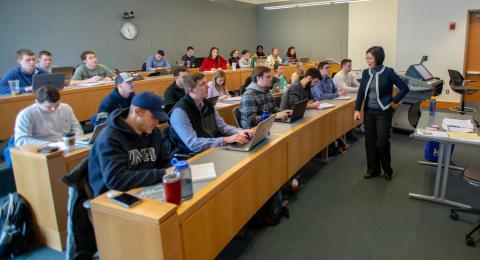Teaching and Learning Support

Teaching and Learning support is now being offered through several central offices across UNH, including Educational Excellence and Effectiveness (E3), the Provost Office, the Learning and Development and Innovation Team, College of Professional Studies Online Center for Academic Engagement, and Teaching & Learning Technologies. Collectively we are all working to organize our a rich collection of resources and information to support the university's mission of enhancing student learning through the continual improvement of teaching on the Teaching and Learning Resource Hub (which many of you have been using for the last several years). A Calendar of programming may be found on the Teaching and Learning Resource Hub.
Consultations with the Educational Excellence and Effectiveness Teaching and Learning Specialist
Courses and Resources
Teaching and Learning Resource Hub has many great resources and strategies for designing a course, active learning, large enrollment classes, labs, studio and performance, and utilizing technology (including generative AI).
Some helpful resources on the Teaching and Learning Resource Hub include:
- Midcourse Assessment Process (MAP): a voluntary activity requested by the instructor to gather anonymous student feedback about the course mid-semester via an online form in Qualtrics (UNH's online survey platform).
- Student Experience of Learning (SEL) Survey: the course feedback survey used at UNH.
- Student Cognition Toolbox: a set of online Modules that instruct students on study strategies (informed by the science of learning) that have been shown to improve students’ learning, retention, and transfer of material in academic courses.
- Teaching and Learning Library: a collection of books on teaching and learning available online.
- LDI Courses: Access self-paced courses Fundamentals of Online Instruction & Fundamentals of Active Learning.
Teaching & Learning Technologies promotes and supports the collaborative application of educational and instructional technology to teaching, learning and digital communication for the University. This course provides essentials for connecting, teaching, and developing your skills with technology at UNH.
Calendar of drop-in training sessions for teaching & learning technologies
Request a one on one session with someone to help you (for example, with Canvas)
Request a one-on-one session with an instructional designer.
|
FITSI : AI in the Classroom - August 2024 (August 2025 topic TBD)
New Faculty Orientation - August 18 & 19, 2025
